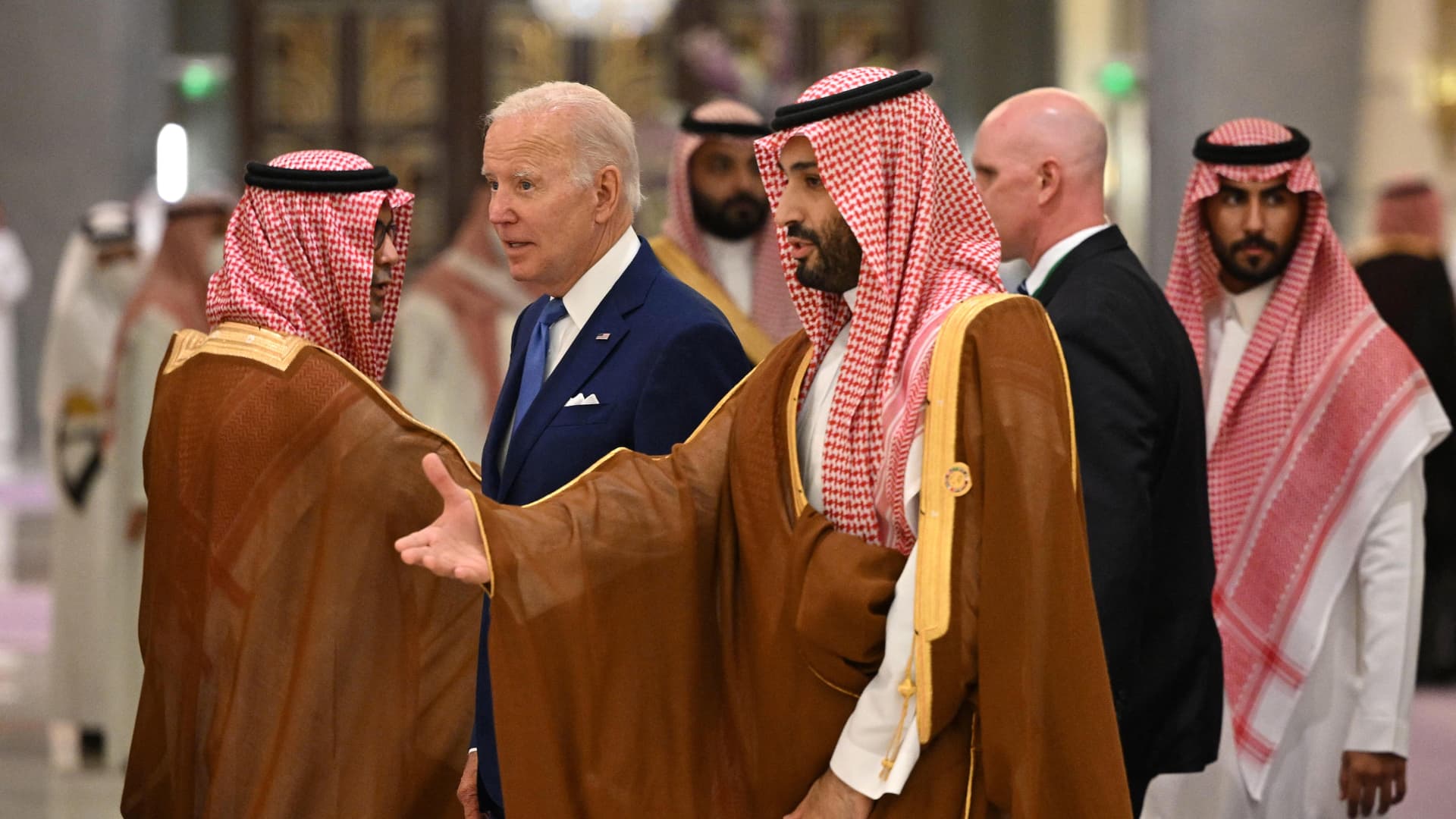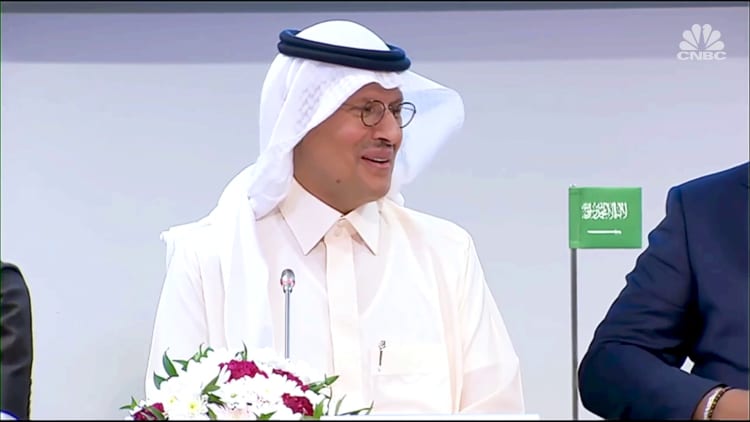
Energy analysts believe the deep production cuts could yet backfire for OPEC kingpin and U.S. ally Saudi Arabia.
Mandel Ngan | Afp | Getty Images
The White House angrily pushed back at OPEC+ after the oil producer group announced its largest supply cut since 2020, lashing out at what President Joe Biden’s administration described as a “shortsighted” decision that came despite U.S. pressure to pump more to help the global economy.
Energy analysts believe the deep production cuts could yet backfire for OPEC kingpin and U.S. ally Saudi Arabia, particularly as Biden hinted Congress would soon seek to rein in the Middle East-dominated group’s influence over energy prices.
OPEC and non-OPEC allies, a group often referred to as OPEC+, agreed on Wednesday to reduce oil production by 2 million barrels per day from November. The move is designed to spur a recovery in oil prices, which had fallen to roughly $80 a barrel from more than $120 in early June.
International benchmark Brent crude futures traded at $93.53 a barrel during Thursday morning deals in London, up around 0.2%. U.S. West Texas Intermediate futures, meanwhile, stood at $87.83, almost 0.1% higher.
The U.S. had repeatedly called on the energy alliance, which includes Russia, to pump more to lower fuel prices ahead of midterm elections next month.
In a statement, the White House said Biden was “disappointed by the shortsighted decision by OPEC+ to cut production quotas while the global economy is dealing with the continued negative impact of Putin’s invasion of Ukraine.”
It added that Biden had directed the Department of Energy to release another 10 million barrels from the Strategic Petroleum Reserve next month.
“In light of today’s action, the Biden Administration will also consult with Congress on additional tools and authorities to reduce OPEC’s control over energy prices,” the White House said.
Today’s dog whistle may be interpreted as a sign that the President will not necessarily stand in the way of a floor vote on the bill that would declare OPEC a cartel and subject the members to Sherman anti-trust legislation.
Helima Croft
RBC Capital Markets
Strategists led by Helima Croft at RBC Capital Markets said that while the U.S. signaled further Strategic Petroleum Reserve releases were in the offing, they were unlikely to see another blockbuster release in the near term.
“A more clear risk, in our view, is the introduction of US product export restrictions in a rising retail gasoline price environment,” analysts at RBC Capital Markets said.
“Congressional action on NOPEC legislation also looks like a credible outcome in light of the NSC statement about working with Congress to reduce OPEC’s overall influence on the oil market. White House opposition to NOPEC has served as a restraining influence on Congressional leaders,” they continued.
“Today’s dog whistle may be interpreted as a sign that the President will not necessarily stand in the way of a floor vote on the bill that would declare OPEC a cartel and subject the members to Sherman anti-trust legislation.”
What is NOPEC?
The No Oil Producing and Exporting Cartels, or NOPEC, bill is designed to protect U.S. consumers and businesses from artificial oil spikes.
The U.S. legislation, which passed a Senate committee in early May but has not yet been signed into law, could expose OPEC countries and partners to lawsuits for orchestrating supply cuts that raise global crude prices.
To take effect, the bill would need to be passed by the full Senate and the House, before being signed into law by the president.
Top OPEC ministers have previously criticized the NOPEC bill, warning the U.S. legislation would bring greater chaos to energy markets.

Speaking at a news conference in Vienna, Austria, on Wednesday, Saudi Energy Minister Prince Abdulaziz bin Salman said, “We will continuously prove that OPEC+ is here not only to stay but here to stay as a moderating force to bring about stability.”
OPEC Secretary-General Haitham Al Ghais also defended the group’s decision to impose deep output cuts, saying the alliance was seeking to provide “security [and] stability to the energy markets.”
Asked by CNBC’s Hadley Gamble whether OPEC+ was doing so at a price, Al Ghais replied: “Everything has a price. Energy security has a price as well.”
OPEC+ decision ‘cannot stand’
Energy analysts said the actual impact of the group’s supply cuts for November was likely to be limited, with unilateral reductions by Saudi Arabia, the United Arab Emirates, Iraq and Kuwait likely to do the main job.
What’s more, analysts said it is currently difficult for OPEC+ to form a view more than a month or two into the future as the energy market faces the uncertainty of more European sanctions on non-OPEC producer Russia — including on shipping insurance, price caps and reduced petroleum imports.
Oil prices have fallen to roughly $80 from over $120 in early June amid growing fears about the prospect of a global economic recession.
Bloomberg | Getty Images
Speaking at a news conference during a visit to Chile, U.S. Secretary of State Antony Blinken said Wednesday that Washington has made its views clear to OPEC members.
Asked whether he was specifically disappointed with U.S. ally Saudi Arabia, Blinken replied, “We have a multiplicity of interests with regard to Saudi Arabia and I think the President laid those out during his trip.”
These include improving relations between Arab countries and Israel, Yemen and working closely with Riyadh to try to continue the truce, Blinken said.
“But we are working every single day to make sure to the best of our ability that, again, energy supply from wherever is actually meeting demand in order to ensure that energy is on the market and that prices are kept low.”
Sen. Bernie Sanders, I-Vt., said via Twitter: “OPEC’s decision to cutback on production is a blatant attempt to increase gas prices at the pump that cannot stand.”
“We must end OPEC’s illegal price-fixing cartel, eliminate military assistance to Saudi Arabia, and move aggressively to renewable energy,” he added.
